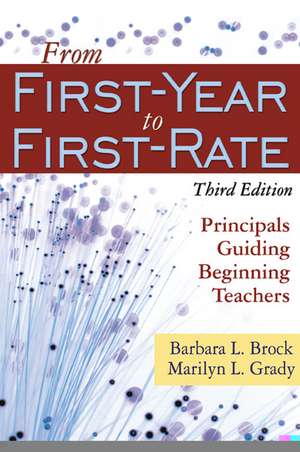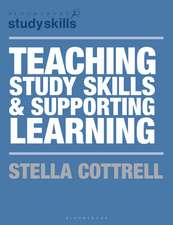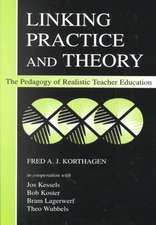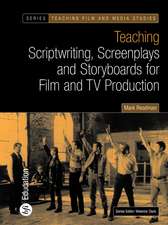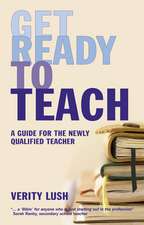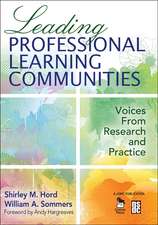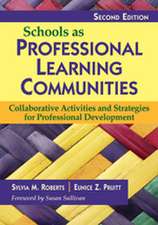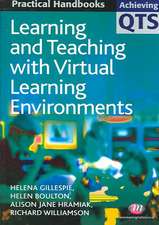From First-Year to First-Rate: Principals Guiding Beginning Teachers
Autor Barbara L. Brock, Marilyn L. Gradyen Limba Engleză Paperback – 5 mar 2007
Preț: 216.32 lei
Nou
Puncte Express: 324
Preț estimativ în valută:
41.39€ • 43.33$ • 34.45£
41.39€ • 43.33$ • 34.45£
Carte tipărită la comandă
Livrare economică 31 martie-14 aprilie
Preluare comenzi: 021 569.72.76
Specificații
ISBN-13: 9781412916035
ISBN-10: 1412916038
Pagini: 160
Dimensiuni: 152 x 229 x 11 mm
Greutate: 0.25 kg
Ediția:Third Edition
Editura: SAGE Publications
Colecția Corwin
Locul publicării:Thousand Oaks, United States
ISBN-10: 1412916038
Pagini: 160
Dimensiuni: 152 x 229 x 11 mm
Greutate: 0.25 kg
Ediția:Third Edition
Editura: SAGE Publications
Colecția Corwin
Locul publicării:Thousand Oaks, United States
Recenzii
"Provides a timely and significant update to the field of new teacher induction, an accurate portait of first-year teachers and their diverse set of needs, and ways principals can support new teachers so they emerge as strong, capable professionals."
Cuprins
Acknowledgments
About the Authors
Introduction
1. Understanding the Beginning Teacher
The Mature Beginner
Alternative Certification
Beginning Teachers From Minority Groups
Reentry to Teaching
Experienced Teachers in a New School
Summary
2. Helping Beginning Teachers Face Problems and Barriers
Reality Shock
Theoretical Knowledge Base
Administrators and Expectations
Isolation
New Kid on the Block
Classroom Dilemmas
Addressing Differing Student Needs
Assessment
Setup for Failure
Inferior Working Conditions
Are You Old Enough to Be a Teacher?
Nonpublic Schools
Rural Schools
Overwhelmed
Summary
3. Acclimating the Beginning Teacher
The Strength of School Cultures
Socializing the Beginning Teacher
Summary
4. Working With Beginning Teachers: The Role of the Principal
The Power of the Principal
The Leadership of the Principal
Why Should Principals Work With Beginning Teachers?
What Expectations Do Principals Have?
What Is the Principal's Role With Beginning Teachers?
What Problems Are Within the Control of the Principal?
Formative and Summative Evaluation
Support for the Principal
How Do Principals Find the Time to Help?
Assessing Time Spent
Taking Charge of Your Time
Summary
5. Starting Orientation Before the School Year Begins
The Orientation Phase
Orientation Meetings: Setting the Stage
The Role of the Principal in Orientation
Summary
6. Developing a Good Induction Program
What Is Developmental Induction?
Organizational Structure
Program Delivery
Summary
7. Building a Teacher-Mentor Support Team
Where Did the Idea of Mentors Originate?
How Do We Know That Mentoring Works?
What Are the Benefits of Mentorships?
Beginning a Teacher-Mentor Program
The Needs of New Teachers
The Framework of a Mentor Program
What Are the Requirements for a Mentor?
Matching Mentors With Entry-Year Teachers
The Process of Mentoring
How Should Mentors Be Oriented?
Training of Mentors
Diagnosing Problems
Conferencing With Beginners
The Role of Other Faculty
Administrative Support
University Consultants
Program Evaluation
Summary
8. Helping Beginning Teachers With Common Problems
Helping With Specific Problems
The Principal's Role
The Teacher's Role--And Ways the Principal Can Help
Summary
9. Measuring Induction Program Success
Needs Assessment
Goals
Year-End Evaluation
Principals' Self Assessments
Summary
10. Integrating Induction and Career-Long Development
Development That Spans a Teaching Career
Strategies for Adult Learners
Meeting the Needs of the Developing Adult
When Reflection and Renewal Diminish
Fostering a Culture for Growth
A Model for Continuous Development
A Model for Continuous Learning
Summary
References
About the Authors
Introduction
1. Understanding the Beginning Teacher
The Mature Beginner
Alternative Certification
Beginning Teachers From Minority Groups
Reentry to Teaching
Experienced Teachers in a New School
Summary
2. Helping Beginning Teachers Face Problems and Barriers
Reality Shock
Theoretical Knowledge Base
Administrators and Expectations
Isolation
New Kid on the Block
Classroom Dilemmas
Addressing Differing Student Needs
Assessment
Setup for Failure
Inferior Working Conditions
Are You Old Enough to Be a Teacher?
Nonpublic Schools
Rural Schools
Overwhelmed
Summary
3. Acclimating the Beginning Teacher
The Strength of School Cultures
Socializing the Beginning Teacher
Summary
4. Working With Beginning Teachers: The Role of the Principal
The Power of the Principal
The Leadership of the Principal
Why Should Principals Work With Beginning Teachers?
What Expectations Do Principals Have?
What Is the Principal's Role With Beginning Teachers?
What Problems Are Within the Control of the Principal?
Formative and Summative Evaluation
Support for the Principal
How Do Principals Find the Time to Help?
Assessing Time Spent
Taking Charge of Your Time
Summary
5. Starting Orientation Before the School Year Begins
The Orientation Phase
Orientation Meetings: Setting the Stage
The Role of the Principal in Orientation
Summary
6. Developing a Good Induction Program
What Is Developmental Induction?
Organizational Structure
Program Delivery
Summary
7. Building a Teacher-Mentor Support Team
Where Did the Idea of Mentors Originate?
How Do We Know That Mentoring Works?
What Are the Benefits of Mentorships?
Beginning a Teacher-Mentor Program
The Needs of New Teachers
The Framework of a Mentor Program
What Are the Requirements for a Mentor?
Matching Mentors With Entry-Year Teachers
The Process of Mentoring
How Should Mentors Be Oriented?
Training of Mentors
Diagnosing Problems
Conferencing With Beginners
The Role of Other Faculty
Administrative Support
University Consultants
Program Evaluation
Summary
8. Helping Beginning Teachers With Common Problems
Helping With Specific Problems
The Principal's Role
The Teacher's Role--And Ways the Principal Can Help
Summary
9. Measuring Induction Program Success
Needs Assessment
Goals
Year-End Evaluation
Principals' Self Assessments
Summary
10. Integrating Induction and Career-Long Development
Development That Spans a Teaching Career
Strategies for Adult Learners
Meeting the Needs of the Developing Adult
When Reflection and Renewal Diminish
Fostering a Culture for Growth
A Model for Continuous Development
A Model for Continuous Learning
Summary
References
Notă biografică
Barbara L. Brock is a professor of education at Creighton University in Omaha, Nebraska. She has held a variety of positions in education, including education department chair, director of school administration, elementary principal, and K-12 teacher. She presents nationally and internationally on topics of beginning teacher induction, leadership succession, teacher and principal burnout, and educators with disabilities. She is coauthor with Marilyn Grady of Principals in Transition: Tips for Surviving Succession, From First-Year to First-Rate: Principals Guiding New Teachers, Rekindling the Flame: Principals Combating Teacher Burnout, Avoiding Burnout: A Principal¿s Guide to Keeping the Fire Alive, and Launching Your First Principalship. She has published in a number of journals, including The Journal of the Mid-Western Research Association, Educational Considerations, Connections, Clearinghouse, and Catholic Education: A Journal of Inquiry and Practice. She received her bachelor of arts degree in art education from Briar Cliff University, a master of arts with a specialty in school administration from Creighton University, and a doctorate in administration, curriculum, and instruction from the University of Nebraska-Lincoln.
Descriere
This new edition of the bestseller features more voices from first-year teachers and provides strategies for developing a first-year induction plan to help teachers become first-rate educators.
